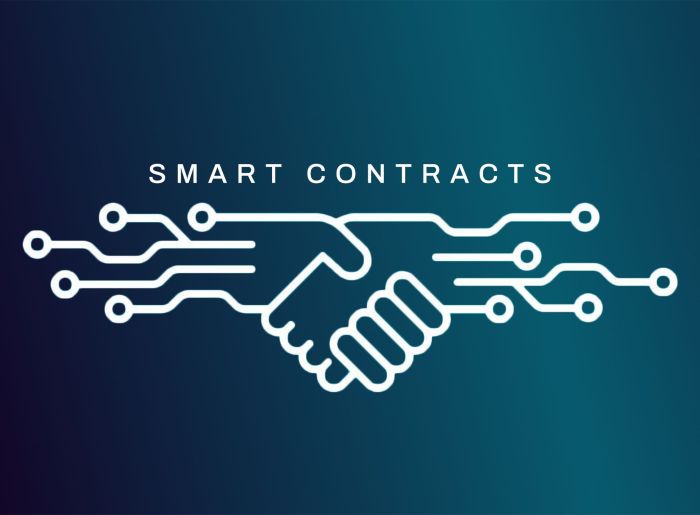Smart Contracts represent a technological revolution, automating agreements and transactions with unparalleled efficiency and security. These self-executing contracts, encoded in blockchain technology, eliminate the need for intermediaries, fostering trust and transparency in various sectors. From supply chain management to digital asset ownership, their impact is rapidly transforming how we conduct business and interact online.
<script async="async" data-cfasync="false" src="//pl27571810.revenuecpmgate.com/5b695ee9e17a297f791ef052f96b968a/invoke.js"></script> <div id="container-5b695ee9e17a297f791ef052f96b968a"></div>

The core functionality of a smart contract lies in its ability to automatically execute pre-defined terms upon the fulfillment of specific conditions. This automation eliminates delays, reduces costs associated with intermediaries, and minimizes the risk of human error. Furthermore, the immutability of blockchain technology ensures the integrity and security of the contract, providing a robust and reliable system for enforcing agreements.
Smart contracts are self-executing contracts with the terms of the agreement between buyer and seller being directly written into lines of code. They’re stored on a blockchain, a decentralized and immutable ledger, automating the execution of an agreement so that all participants can be immediately certain of the outcome, without any intermediary’s involvement. This revolutionary technology is transforming various industries, offering increased transparency, security, and efficiency.
This guide provides a detailed and comprehensive overview of smart contracts, exploring their functionalities, benefits, limitations, and future implications.
What are Smart Contracts? A Deeper Dive
At their core, smart contracts are programs stored on a blockchain that automatically execute when predefined conditions are met. They eliminate the need for intermediaries like lawyers or notaries, reducing costs and speeding up processes. Think of them as automated vending machines: you insert money (fulfill a condition), and the machine dispenses the product (executes the contract). However, instead of snacks, smart contracts deliver digital assets, legal agreements, or other valuable outcomes.
Key Characteristics of Smart Contracts:
- Automation: Smart contracts automatically execute their terms upon the fulfillment of specific conditions, eliminating manual intervention.
- Transparency: All transactions and contract executions are recorded on a public blockchain, making them auditable and transparent.
- Immutability: Once a smart contract is deployed on a blockchain, its code cannot be altered, ensuring the integrity and enforceability of the agreement.
- Security: The decentralized nature of blockchain technology enhances the security of smart contracts, making them resistant to tampering and fraud.
- Efficiency: Smart contracts streamline processes by automating tasks and eliminating intermediaries, reducing costs and time delays.
How Smart Contracts Work: A Technical Overview
Smart contracts are typically written in programming languages like Solidity (for Ethereum), Rust (for Solana), or others specific to the chosen blockchain platform. These languages allow developers to define the conditions and actions that trigger the execution of the contract. The code is then compiled and deployed to the blockchain network. Once deployed, the contract’s logic is executed automatically when the predefined conditions are satisfied.
This execution is verified by the network’s nodes, ensuring its integrity and immutability.

The Lifecycle of a Smart Contract:
- Development: Writing the contract code in a suitable programming language.
- Compilation: Transforming the code into a format understandable by the blockchain.
- Deployment: Uploading the compiled code to the blockchain network.
- Execution: Automatic execution of the contract’s logic when predefined conditions are met.
- Monitoring: Tracking the contract’s execution and ensuring its proper functioning.
Benefits of Using Smart Contracts
Smart contracts offer a wide range of benefits across various industries. Their advantages stem from their inherent characteristics of automation, transparency, security, and efficiency.
Advantages in Different Sectors:
- Supply Chain Management: Tracking goods, verifying authenticity, and automating payments.
- Healthcare: Securely storing and sharing patient data, automating insurance claims.
- Finance: Facilitating faster and cheaper transactions, automating lending and borrowing processes (Decentralized Finance or DeFi).
- Real Estate: Streamlining property transactions, automating escrow services.
- Digital Identity: Securely managing and verifying digital identities.
Limitations and Challenges of Smart Contracts
Despite their numerous advantages, smart contracts also have limitations and challenges that need to be addressed.
Potential Drawbacks:
- Code vulnerabilities: Bugs or flaws in the code can lead to unexpected behavior or security breaches (Oracle problem).
- Legal enforceability: The legal status of smart contracts varies across jurisdictions.
- Scalability issues: Some blockchain networks may struggle to handle a large number of smart contract executions.
- Complexity: Developing and deploying smart contracts can be complex and require specialized skills.
- Lack of human intervention: The inability to easily intervene in case of unforeseen circumstances can be a limitation.
The Future of Smart Contracts
Smart contracts are still a relatively new technology, but their potential is immense. Ongoing research and development are addressing the existing limitations and expanding their capabilities. The integration of smart contracts with other technologies, such as artificial intelligence (AI) and the Internet of Things (IoT), will further enhance their functionality and applicability.
Emerging Trends:, Smart Contract
- Increased adoption across industries: More businesses are exploring and implementing smart contracts to streamline their operations.
- Development of more user-friendly tools: Tools are being developed to make it easier for non-programmers to create and manage smart contracts.
- Integration with other technologies: Smart contracts are being integrated with AI and IoT to create more sophisticated and automated systems.
- Improved security measures: Research is ongoing to enhance the security of smart contracts and mitigate vulnerabilities.
- Regulatory frameworks: Governments are developing regulatory frameworks to address the legal and ethical implications of smart contracts.
Frequently Asked Questions (FAQ): Smart Contract
- Q: Are smart contracts legally binding? A: The legal enforceability of smart contracts varies depending on jurisdiction. While the code itself is automatically executed, the underlying agreement may still require legal validation.
- Q: How secure are smart contracts? A: Smart contracts are generally secure due to the immutability of blockchain technology. However, vulnerabilities in the code can be exploited, highlighting the importance of thorough auditing.
- Q: What are the costs involved in using smart contracts? A: Costs vary depending on the blockchain network, gas fees (transaction fees), and development costs.
- Q: Who can create smart contracts? A: Smart contract development requires programming skills and knowledge of blockchain technology. However, tools are emerging that simplify the process for non-programmers.
- Q: What are some examples of smart contracts in use today? A: Examples include supply chain tracking, decentralized finance (DeFi) applications, digital identity management, and automated escrow services.
References
- Ethereum Smart Contracts Documentation
- Investopedia: Smart Contract
- Blockchain.com: What is a Smart Contract?
Call to Action
Ready to explore the potential of smart contracts for your business? Contact us today to learn how we can help you leverage this transformative technology.
Questions and Answers
What are the limitations of smart contracts?
While powerful, smart contracts have limitations. They are only as good as the code they are written in, vulnerable to coding errors. Furthermore, legal enforceability can be complex depending on jurisdiction and the specifics of the contract.
How secure are smart contracts?
Security depends on the quality of the code and the underlying blockchain. Well-audited, expertly written smart contracts on robust blockchains offer high security, but vulnerabilities can exist and require careful consideration.
Can smart contracts be used for all types of agreements?
No. Smart contracts are best suited for agreements with clearly defined parameters and automated execution conditions. Complex agreements requiring human judgment or interpretation may not be ideal candidates.

